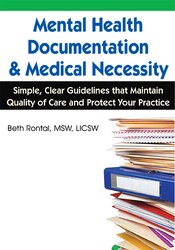

Clinical documentation is a professional standard of care, but there is little guidance about what to write or how to write it. Paperwork can seem disconnected from helping clients. It can create confusion and anxiety about possible violations of privacy and confidentiality, potentially traumatic audits, and even legal nightmares.
What are the criteria for a client needing services? How is medical necessity justified? How can the “golden thread” of documentation be created and maintained so that audits are passed and a professional standard of care is maintained even when insurance is not involved?
This recording can help answer these questions and more! Effective clinical documentation is not rocket science. It is a formula that, once learned, translates clinical thinking into clean documentation, so that writing notes and treatment plans can be done quickly and efficiently, getting authorizations is easy, and audits are not as threatening. In addition, confidentiality is not violated and continuity of care is practiced.
Choose mastery over misery and allow good clinical documentation to be a contribution to high quality clinical work rather than a detour away from it.
| File type | File name | Number of pages | |
|---|---|---|---|
| Manual - Mastery in Mental Health Documentation & Medical Necessity (2.60 MB) | 51 Pages | Available after Purchase |

Beth Rontal, MSW, LICSW, is a psychotherapist in private practice in Brookline, Massachusetts, as well as a documentation consultant (wizard) and private supervisor. Ms. Rontal earned her MFA from Boston University, and her Master’s in Social Work from Simmons College in Boston.
She was clinical supervisor at a mental health clinic for 16 years, where she was instrumental in developing and implementing the clinic’s first electronic documentation system. This implementation significantly reduced documentation time and errors and decreased the paperwork returned by clinicians from 65% to 8%, which in turn allowed for the addition of 3 to 5 clinical hours per week and generated thousands of dollars in savings for the company.
Ms. Rontal continues to be a developer and consultant in the field of clinical documentation. She is a sought-after national lecturer who has taught seminars over the course of many years, in addition to having published numerous articles on the topic.
Speaker Disclosures:
Financial: Beth Rontal maintains a private practice. She is the founder and trainer for Documentation Wizard, LLC. Beth Rontal receives a speaking honorarium and recording royalties from Psychotherapy Networker and PESI, Inc. She has no relevant financial relationships with ineligible organizations.
Non-financial: Beth Rontal is a member of the NASW.
Please wait ...